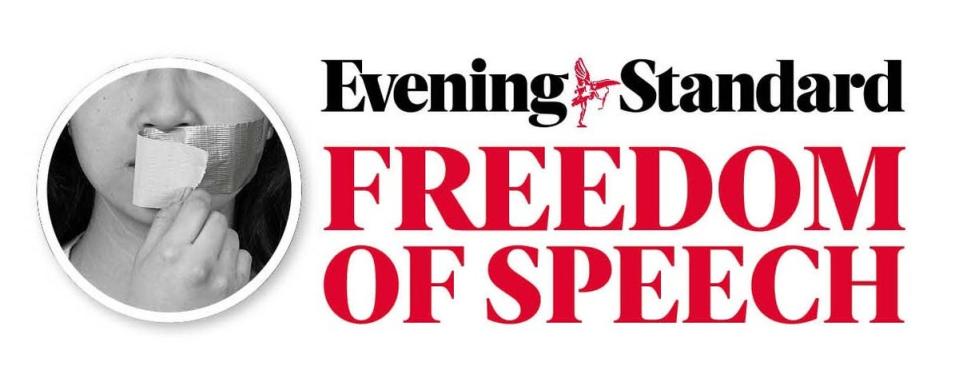What the US can teach us about free speech — Evgeny Lebedev talks to Sam Harris

The philosopher Sam Harris and I meet six weeks after the terror attacks of October 7 — just one day before Israel and Gaza agree to a truce. That period has seen the deadliest eruption of violence since the Yom Kippur War, with the single deadliest day for Jews since the Holocaust and the casualties in Gaza surpassing those of the Nakba. In London, thousands have marched each weekend in support of Palestine, with many applauding our great city as a symbol of peace and free expression. We should not be so naïve, says Harris: “Tolerance of intolerance is cowardice.”
Harris is one of the most intelligent people alive today. He is a neuroscientist, best-selling author, host of the Making Sense podcast and founder of the meditation app Waking Up. He supports free speech — but more importantly, he supports reason.
Born to a Jewish mother, for him the recent protests are a step too far. Watching footage of them, he says, is akin to watching “hundreds of thousands of people coming into the streets in support of Hamas”. An avowed atheist, Harris rose to prominence as one of the “four horsemen” of the movement’s nouvelle vague (his peers are well known: Daniel Dennett, Richard Dawkins and Christopher Hitchens). He has made no secret of his disdain of the extremes of Islam. While hostages return to their families this week, the real crisis, he tells me, is far from over.
“The entire world is being held hostage by the religious fanaticism of one community.”
Harris continues to be stunned by Islam’s grip on the world — even after 9/11 and the atrocities that followed the Arab Spring. Support for the Islamic faith is so strong, he argues, it has won over communities at odds with its core beliefs. “We have so-called feminists like Code Pink supporting Hamas. That level of moral confusion is anti-inspirational.” But that does not mean we should limit their right to free speech. “There’s a certain amount of intolerance that we’re just going to have to be comfortable with,” Harris says, in order to defend the right to speak openly. He draws the line where intolerance tips over into genuine threat.
If I could wave a magic wand and give everyone the First Amendment, I would
Sam Harris
Like all good thinkers, Harris’s beliefs flow from a set of ideals. His are looser, less stringent than most. The ideal society is, above all, open, and the ideal citizen always seeking to better themselves. Intellectual brilliance must come with spiritual awareness: only then can we be both clever and happy. Harris’s peers have taken swipes at his meditation practice — Hitchens rejected nirvana altogether, once saying “I like anxiety” — but in 2023, Harris’s belief system is the one we should all be getting behind.
Free speech is key to his world view: we need it “to keep our beliefs and aspirations in line with reality”. For instance, with regards to sex. To say, “only women can get pregnant”, and face possible arrest for hate speech, is absurd. In fact, he is “uncomfortable” with the very notion of hate speech.
“It’s a double standard,” he says, for someone to be charged with a hate crime for saying sex is immutable but not when running through jihadist mantras in Trafalgar Square.
There is no such thing as hate speech in the US. This is because free speech is enshrined in the constitution. “If I could wave a magic wand and give everyone the First Amendment, I would,” Harris says. Yet he also worries that we may need a law “to prevent the erosion of our liberty just to live normal lives”. Freedom of assembly — as seen in this month’s protests — can be taken too far when the threat of violence ensues.
The incentives and reward structure of social media push normal people to behave like psychopaths
Sam Harris
Free speech, then, can never be absolute. Harris has no time for Elon Musk, who branded himself a free speech absolutist when he bought Twitter in 2022. “He is behaving unconscionably on X,” Harris says of the billionaire. He claims his caustic online behaviour shows a “dysregulation of personality”.
Harris knows more than most about the operations of the mind: he wrote his PhD on the brain’s differing responses to belief, non-belief, and uncertainty. He is acutely aware of the damage inflicted on our brains by social media — the joint threat it poses to our intellect and mental health. “The incentives and reward structure of social media,” he argues, push “normal people” to behave “like psychopaths”. So Harris has left that world entirely, ditching X after Musk reinstated Donald Trump’s account. “Right now, it’s on the way to becoming a giant version of 4chan,” Harris says.
The philosopher talks about X like a bad drug habit he’s left behind — for his “misanthropic” comedowns followed insane highs. “Twitter was like a slot machine for dopamine,” he says. As a digital town square, it’s both corrosive and compelling, tapping into our tribal instincts and forcing us to take sides.
For years Twitter has structured and amplified the cultural discourse. Is it set to keep growing as a forum of ideas? Is it the future of media?
The New York Times coming forward to say ‘Sorry that video was fake’ shows we need the old gatekeepers
Sam Harris
Harris hopes not, and believes the pendulum is swinging back. “People have become sceptical of what they see on those platforms, more sensitive to the noise.”
Ironically, it is in further technological advancement that he finds a solution. “When you see a video of Joe Biden declaring war on Russia, and it looks perfect, that’s the point where nobody knows what they’re looking at anymore.”
Artificial intelligence shows us we can “never trust anything” — until the New York Times comes forward and says, “Sorry, that video was fake”. It shows us that we need “the old gatekeepers, more than we ever needed them”. Whatever fact-checking infrastructure the New York Times uses to verify materials, “our devices need the same”, Harris says. As the owner of this newspaper, his trust in the often sneered-at “mainstream media” is music to my ears. I fear that we have a long way to go before the pendulum swings back.
Harris concurs: “People don’t even read articles anymore: they read headlines forwarded to them on social media.” The piece of glass in our pockets has fragmented our attention. The solution lies in the crux of Harris’s philosophy: intellect twinned with happiness. If we recognise platforms like X as nefarious and invest our energy elsewhere — say, in books, newspapers and meditation — nirvana should not be far behind.
Our evolutionary tribalism has come full circle: the values of the Enlightenment — of a culture that carries out free speech and argument through learning and literature — has been nullified in 20 short years by the advent of modern tech. “It’s making us stupid and ungovernable,” Harris says. “It could be the thing that destroys democracy”.

Social media, like all addictions, fuels obsession — political obsession especially. This is tantamount to tribalism. “Organising one’s life around politics is a derangement of our ability to think clearly about anything else,” Harris says.
Nothing exemplifies this more clearly that the “eruption of antisemitism since October 7” — a direct consequence of social media, he claims. Those uploading footage of the marches are “feeding this machinery, and being further provoked by the machinery itself.”
Harris is a man whose defence of free speech is not without caveats. Of all the thinkers once associated with the intellectual dark web (Ben Shapiro, Jordan Peterson, Douglas Murray, Camille Paglia), he has emerged as the most inspiringly pragmatic. On Saudi Arabia, cradle of Wahhabism, he is as quick to recognise its role in once nurturing and exporting fundamentalism as he is to acknowledge their clampdown on extremism in recent years. (Note there have been no terror attacks on European soil since 2020.)
His atheism is refreshingly undogmatic, made much stronger for embracing spirituality. It is a balancing act to hold diverging views in tandem — and the sign of a well-attuned mind. More hardline thinkers might view this as a cop out, a failure to commit to a clear and codified vision. But I like Harris’s way — it is freer.
The full conversation will be available to listen to on The Standard podcast

 Yahoo News
Yahoo News 
